Diet
How can what you eat and drink help the planet?
- Tea or coffee?
 Does tea or coffee have more emissions? Tea and coffee are amongst the most popular drinks consumed across the world. Around 2 billion cups of coffee and 5 billion cups of tea are drunk everyday worldwide. They create a carbon footprint through their production. If you are indifferent between drinking either of the drinks, choose… Read more: Tea or coffee?
Does tea or coffee have more emissions? Tea and coffee are amongst the most popular drinks consumed across the world. Around 2 billion cups of coffee and 5 billion cups of tea are drunk everyday worldwide. They create a carbon footprint through their production. If you are indifferent between drinking either of the drinks, choose… Read more: Tea or coffee? - Beer or wine?
 Beer and wine are the most popular alcoholic drink. In the UK, 68 litres of beer and 11.88 bottles of wine were drunk per person in 2022 in the UK. So how do carbon emissions compare between beer and wine? Research by Bridle (2020) showed beer and wine as a drink have the same carbon… Read more: Beer or wine?
Beer and wine are the most popular alcoholic drink. In the UK, 68 litres of beer and 11.88 bottles of wine were drunk per person in 2022 in the UK. So how do carbon emissions compare between beer and wine? Research by Bridle (2020) showed beer and wine as a drink have the same carbon… Read more: Beer or wine? - What should a diet in a net zero world look like?A diet that is suitable for a net zero world is quite different from a typical diet people eat today. Today’s diet is meat rich, with more saturated fat, sugar and salt than we should be consuming. In the UK alone, poor diet accounts for 13% of deaths as it causes diabetes, cancer, high blood… Read more: What should a diet in a net zero world look like?
- Plant based diets for a net zero world
 To adapt to a net zero world and halve our carbon footprint by 2030, we need to reduce our carbon emissions from food. About a quarter of carbon emissions come our diet. The average person creates 6kg of carbon emissions from what they eat daily. Ideally, we would halve this to 3kg by 2030 to… Read more: Plant based diets for a net zero world
To adapt to a net zero world and halve our carbon footprint by 2030, we need to reduce our carbon emissions from food. About a quarter of carbon emissions come our diet. The average person creates 6kg of carbon emissions from what they eat daily. Ideally, we would halve this to 3kg by 2030 to… Read more: Plant based diets for a net zero world - Carbon emission reducing snacks
 Carbon emission reducing snacks What snacks should you eat if you want to reduce your carbon footprint? Professor Bridle’s book ‘Food and climate change without the hot air’ analyses typical snacks we eat and suggest ways we can make small changes in our snacks to change our footprint. Chocolate Chocolate bars will vary in their… Read more: Carbon emission reducing snacks
Carbon emission reducing snacks What snacks should you eat if you want to reduce your carbon footprint? Professor Bridle’s book ‘Food and climate change without the hot air’ analyses typical snacks we eat and suggest ways we can make small changes in our snacks to change our footprint. Chocolate Chocolate bars will vary in their… Read more: Carbon emission reducing snacks - Which coffee has lower carbon emissions?
 If you love your caffeine fix and can’t live without coffee, how can you choose a coffee which lowers your carbon footprint? Coffee and milk Adding cow’s milk to coffee makes a big difference to a coffee’s carbon footprint because a lot of land is needed for cows to graze and to grow their food.… Read more: Which coffee has lower carbon emissions?
If you love your caffeine fix and can’t live without coffee, how can you choose a coffee which lowers your carbon footprint? Coffee and milk Adding cow’s milk to coffee makes a big difference to a coffee’s carbon footprint because a lot of land is needed for cows to graze and to grow their food.… Read more: Which coffee has lower carbon emissions? - Tea or coffee?
 Which one has more carbon emissions? Tea and coffee are amongst the most popular drinks consumed across the world. Around 2 billion cups of coffee and 5 billion cups of tea are drunk everyday worldwide. If you are indifferent between drinking either of the drinks, choose tea over coffee because tea has lower carbon emissions.… Read more: Tea or coffee?
Which one has more carbon emissions? Tea and coffee are amongst the most popular drinks consumed across the world. Around 2 billion cups of coffee and 5 billion cups of tea are drunk everyday worldwide. If you are indifferent between drinking either of the drinks, choose tea over coffee because tea has lower carbon emissions.… Read more: Tea or coffee? - Beer and wine: which has less carbon emissions?
 Beer and wine are the most popular alcoholic drinks. In the UK, 68 litres of beer and 11.88 bottles of wine were drunk per person in 2022 in the UK. So how do carbon emissions compare between beer and wine? Research by Professor Bridle from Universit of York shows beer and wine as a drink… Read more: Beer and wine: which has less carbon emissions?
Beer and wine are the most popular alcoholic drinks. In the UK, 68 litres of beer and 11.88 bottles of wine were drunk per person in 2022 in the UK. So how do carbon emissions compare between beer and wine? Research by Professor Bridle from Universit of York shows beer and wine as a drink… Read more: Beer and wine: which has less carbon emissions? - Choosing a takeaway pizza
 Choosing a takeaway pizza Everyone loves a pizza and its one of the most popular takeaways around the world. But how can you choose a pizza and keep down your carbon footprint? Pizza and cheese One thing to think about when choosing a pizza is the amount of cheese that is on a pizza. Mike… Read more: Choosing a takeaway pizza
Choosing a takeaway pizza Everyone loves a pizza and its one of the most popular takeaways around the world. But how can you choose a pizza and keep down your carbon footprint? Pizza and cheese One thing to think about when choosing a pizza is the amount of cheese that is on a pizza. Mike… Read more: Choosing a takeaway pizza - Choosing a takeaway Indian curry
 An Indian takeaway is one of the most popular takeaways to have in Britain. So, how can we reduce carbon emissions when ordering Indian food? Research by Mike Berners-Lee book ‘How Bad are Bananas?’ shows how the carbon footprint changes as you add different ingredients to an Indian dish. Indian curries and meat As with… Read more: Choosing a takeaway Indian curry
An Indian takeaway is one of the most popular takeaways to have in Britain. So, how can we reduce carbon emissions when ordering Indian food? Research by Mike Berners-Lee book ‘How Bad are Bananas?’ shows how the carbon footprint changes as you add different ingredients to an Indian dish. Indian curries and meat As with… Read more: Choosing a takeaway Indian curry - Desserts and carbon emissions
 Which desserts have a lower carbon footprint? What makes a big difference is individual ingredients in desserts. Dairy ingredients such as milk, butter and cream increase the carbon emissions of a dessert because they are cow-related products. Cows produce the largest number of emissions out of any animals and therefore any product that comes from… Read more: Desserts and carbon emissions
Which desserts have a lower carbon footprint? What makes a big difference is individual ingredients in desserts. Dairy ingredients such as milk, butter and cream increase the carbon emissions of a dessert because they are cow-related products. Cows produce the largest number of emissions out of any animals and therefore any product that comes from… Read more: Desserts and carbon emissions - Myth busting: Organic food
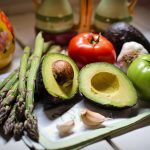 Do you need to buy expensive organic food to be eco-friendly? The answer is NO. This is a big myth that needs dispelling. First, it is not clear why organic food is ‘eco-friendly’. Second it is usually significantly more expensive than food that is not organic and does not last as long. No wonder people… Read more: Myth busting: Organic food
Do you need to buy expensive organic food to be eco-friendly? The answer is NO. This is a big myth that needs dispelling. First, it is not clear why organic food is ‘eco-friendly’. Second it is usually significantly more expensive than food that is not organic and does not last as long. No wonder people… Read more: Myth busting: Organic food - How to cut dairy from your diet
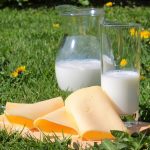 You have probably heard that you should cut meat and dairy from your diet to reduce your carbon footprint. It is more obvious to identify what meat is in our diet and find ways to cut it out. But what do we mean by ‘dairy’ and what food and drinks is it in? What is… Read more: How to cut dairy from your diet
You have probably heard that you should cut meat and dairy from your diet to reduce your carbon footprint. It is more obvious to identify what meat is in our diet and find ways to cut it out. But what do we mean by ‘dairy’ and what food and drinks is it in? What is… Read more: How to cut dairy from your diet - Treat cheese like a meat
 Eating less meat is a route to reducing your carbon footprint. Cutting it out altogether can reduce your carbon footprint by 1 ton a year. But there is an exception is this argument. A vegetarian meal is not automatically better for the environment if it contains lots of cheese. Cheese contains cow’s milk. Dairy cows… Read more: Treat cheese like a meat
Eating less meat is a route to reducing your carbon footprint. Cutting it out altogether can reduce your carbon footprint by 1 ton a year. But there is an exception is this argument. A vegetarian meal is not automatically better for the environment if it contains lots of cheese. Cheese contains cow’s milk. Dairy cows… Read more: Treat cheese like a meat - Beef: The worst thing you can eat
 It is common knowledge that eating meat is bad for the environment. But there is no meat that produces as high carbon emissions as beef. Why? Beef is the main reason for deforestation and mostly destroys tropical rainforests around the world. Tropical rainforests maintain the global water cycle, absorb huge amounts of carbon dioxide and… Read more: Beef: The worst thing you can eat
It is common knowledge that eating meat is bad for the environment. But there is no meat that produces as high carbon emissions as beef. Why? Beef is the main reason for deforestation and mostly destroys tropical rainforests around the world. Tropical rainforests maintain the global water cycle, absorb huge amounts of carbon dioxide and… Read more: Beef: The worst thing you can eat - Eat seasonally to reduce carbon footprint
 Where our food comes from can greatly change the carbon footprint of our dish. Although it is more important what we eat rather than where it comes from, it is worth considering that using certain fruit and vegetables can significantly increase the carbon emissions of our meals at certain times of the year. This is… Read more: Eat seasonally to reduce carbon footprint
Where our food comes from can greatly change the carbon footprint of our dish. Although it is more important what we eat rather than where it comes from, it is worth considering that using certain fruit and vegetables can significantly increase the carbon emissions of our meals at certain times of the year. This is… Read more: Eat seasonally to reduce carbon footprint - Sandwiches and their carbon footprint
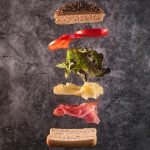 It is lunchtime, and you are going to pick a sandwich from the nearest coffee shop. Which sandwich should you pick if you want to lower your carbon footprint? You probably think that a vegetarian sandwich is always a better option than one with meat. But this is not always the case. Sandwiches and cheese… Read more: Sandwiches and their carbon footprint
It is lunchtime, and you are going to pick a sandwich from the nearest coffee shop. Which sandwich should you pick if you want to lower your carbon footprint? You probably think that a vegetarian sandwich is always a better option than one with meat. But this is not always the case. Sandwiches and cheese… Read more: Sandwiches and their carbon footprint - The carbon footprint of fish
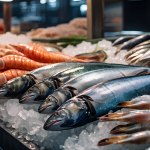 Fish can be part of a healthy, low emissions diet. It is a good substitute for meat with high emissions, such as beef and lamb, and a good source of protein. But there are issues to consider when choosing which fish to eat. The problem of over-fishing affects the population of some species, and some… Read more: The carbon footprint of fish
Fish can be part of a healthy, low emissions diet. It is a good substitute for meat with high emissions, such as beef and lamb, and a good source of protein. But there are issues to consider when choosing which fish to eat. The problem of over-fishing affects the population of some species, and some… Read more: The carbon footprint of fish - The carbon footprint of meat
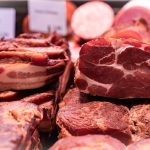 We often hear we need to cut down on meat to reduce our carbon emissions. This may be hard if you love eating meat but with the right information of different types of meat, we can cut down our emissions by making easy substitutions in meals we enjoy. Beef and lamb are the worst meat… Read more: The carbon footprint of meat
We often hear we need to cut down on meat to reduce our carbon emissions. This may be hard if you love eating meat but with the right information of different types of meat, we can cut down our emissions by making easy substitutions in meals we enjoy. Beef and lamb are the worst meat… Read more: The carbon footprint of meat - Plant-based breakfasts
 We should all be eating plant-based breakfasts in a net zero world. But what is a plant-based breakfast like? In some cases, it will be simple substitutions to what you already have, because only dairy products need to be substituted out. In other cases, it will mean being more creative with ingredients. Making your breakfasts… Read more: Plant-based breakfasts
We should all be eating plant-based breakfasts in a net zero world. But what is a plant-based breakfast like? In some cases, it will be simple substitutions to what you already have, because only dairy products need to be substituted out. In other cases, it will mean being more creative with ingredients. Making your breakfasts… Read more: Plant-based breakfasts - Plant based lunches
 What would lunch in a net zero world look like? Plant based lunches contain less meat and dairy and are mostly made up of plants. Meat should only make up a third of the meal at the maximum and should be a garnish to the meal rather than the main thing. Pescatarian, vegetarian and vegan… Read more: Plant based lunches
What would lunch in a net zero world look like? Plant based lunches contain less meat and dairy and are mostly made up of plants. Meat should only make up a third of the meal at the maximum and should be a garnish to the meal rather than the main thing. Pescatarian, vegetarian and vegan… Read more: Plant based lunches - Plant based dinners
 Plant-based meals are what we should be eating in a net zero world. If we reduced the amount of meat and dairy we eat, it would reduce deforestation and carbon emissions dramatically. Less land would be required to grow our food because raising animals and feeding them takes up so much land. If everyone switched… Read more: Plant based dinners
Plant-based meals are what we should be eating in a net zero world. If we reduced the amount of meat and dairy we eat, it would reduce deforestation and carbon emissions dramatically. Less land would be required to grow our food because raising animals and feeding them takes up so much land. If everyone switched… Read more: Plant based dinners - Health benefits of a plant-based diets
 There are a huge number of reasons to adopt a plant-based diet. Not only is it good for the planet and saves you money, but it also improves your health significantly. This is the diet backed by evidence from research centres around the world, such as the Harvard Medical School, and the verdict of such… Read more: Health benefits of a plant-based diets
There are a huge number of reasons to adopt a plant-based diet. Not only is it good for the planet and saves you money, but it also improves your health significantly. This is the diet backed by evidence from research centres around the world, such as the Harvard Medical School, and the verdict of such… Read more: Health benefits of a plant-based diets - Where to start with a plant-based diet
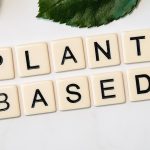 If you are a heavy meat eater, it is hard to know how to switch over to a plant-based diet. A plant-based diet is essential in a Net Zero world as it will halve the carbon emissions from our diet. There are also many benefits to adopting a plant-based diet: you will save up to… Read more: Where to start with a plant-based diet
If you are a heavy meat eater, it is hard to know how to switch over to a plant-based diet. A plant-based diet is essential in a Net Zero world as it will halve the carbon emissions from our diet. There are also many benefits to adopting a plant-based diet: you will save up to… Read more: Where to start with a plant-based diet - How cheese lovers can reduce the impact of cheese
 Cheese as a food product produces large amounts of carbon emissions. Most of the emissions in cheese production comes from the burps of cows. The way cows digest food mean that they produce methane, which is a greenhouse gas which contributes to global warming. Climate change scientists, such as Professor Bernes-Lee, argue cheese should be… Read more: How cheese lovers can reduce the impact of cheese
Cheese as a food product produces large amounts of carbon emissions. Most of the emissions in cheese production comes from the burps of cows. The way cows digest food mean that they produce methane, which is a greenhouse gas which contributes to global warming. Climate change scientists, such as Professor Bernes-Lee, argue cheese should be… Read more: How cheese lovers can reduce the impact of cheese - Ways to reduce the carbon footprint of your favourite beefy meals
 Do your favourite meals include beef, such as Spaghetti Bolognese or a burger? Beef has the highest carbon footprint of all meat because it is the main cause of deforestation in the world and the main reason for the destruction of the Amazon rainforest. Cows also produce methane when they digest food, which is another… Read more: Ways to reduce the carbon footprint of your favourite beefy meals
Do your favourite meals include beef, such as Spaghetti Bolognese or a burger? Beef has the highest carbon footprint of all meat because it is the main cause of deforestation in the world and the main reason for the destruction of the Amazon rainforest. Cows also produce methane when they digest food, which is another… Read more: Ways to reduce the carbon footprint of your favourite beefy meals - Non-ecofriendly reasons to adopt a plant-based diet
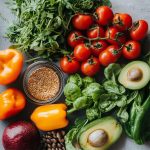 A plant-based diet is the most compatible diet with a Net Zero world. Only diet can sustain a world population that could grow to 10 billion people in the future. In a plant-based diet, plants make up to at least two thirds of your diet and meat only makes up to one third. Plants do… Read more: Non-ecofriendly reasons to adopt a plant-based diet
A plant-based diet is the most compatible diet with a Net Zero world. Only diet can sustain a world population that could grow to 10 billion people in the future. In a plant-based diet, plants make up to at least two thirds of your diet and meat only makes up to one third. Plants do… Read more: Non-ecofriendly reasons to adopt a plant-based diet - Which drinks have the lowest carbon footprint?
 If you are choosing a drink when you are going out, how could you choose a drink with lower carbon emissions? It is not obvious what type of drink is likely to have a lower carbon footprint. What seems like a ‘green’ option may not be. Research by Professor Bridle shows it all depends on… Read more: Which drinks have the lowest carbon footprint?
If you are choosing a drink when you are going out, how could you choose a drink with lower carbon emissions? It is not obvious what type of drink is likely to have a lower carbon footprint. What seems like a ‘green’ option may not be. Research by Professor Bridle shows it all depends on… Read more: Which drinks have the lowest carbon footprint? - The Power of 30+ Plant Foods a Week
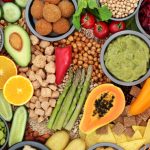 Our guest author, Leticia Drier, nutritionist discusses the benefits of a plant-based diet and how we can use it to improve our health. You might have heard about the idea of eating 30+ plant foods a week to improve your health. It comes from research by The British and American Gut Project (2018) which revealed… Read more: The Power of 30+ Plant Foods a Week
Our guest author, Leticia Drier, nutritionist discusses the benefits of a plant-based diet and how we can use it to improve our health. You might have heard about the idea of eating 30+ plant foods a week to improve your health. It comes from research by The British and American Gut Project (2018) which revealed… Read more: The Power of 30+ Plant Foods a Week - Can you get the right amount of protein on a plant-based diet?
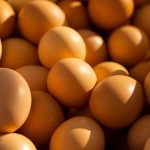 Is it possible to get enough protein in your diet if you reduce the amount of meat you eat? Can carbon footprint of your diet still be low if you are eating plants as a substitute that have come from abroad? This article was inspired from a comment I saw on Instagram about someone expressing… Read more: Can you get the right amount of protein on a plant-based diet?
Is it possible to get enough protein in your diet if you reduce the amount of meat you eat? Can carbon footprint of your diet still be low if you are eating plants as a substitute that have come from abroad? This article was inspired from a comment I saw on Instagram about someone expressing… Read more: Can you get the right amount of protein on a plant-based diet?